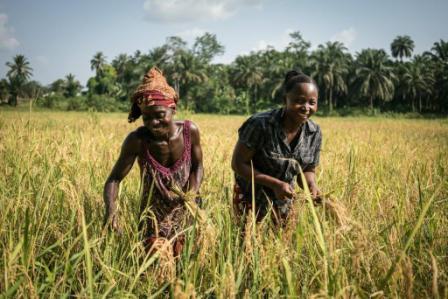Brazil’s commitment to humanitarian efforts ensures food to the poor in 35 countries
BRASILIA –Brazil has provided over 300,000 tons of food commodities to 35 countries through WFP since 2011 and its contributions have increased from US$1 million in 2007 to US$75 million to date, making this South American nation one of WFP’s largest donors, according to Brazilian and WFP officials.
On World Humanitarian Day, Minister Milton Rondó, General Coordinator of International Actions against Hunger, Brazil’s Ministry of External Relations, highlighted Brazil’s success in reducing malnutrition and lifting over 30 million out of poverty in the last decade through the Zero Hunger Strategy. Rondó pointed out that Brazil’s social policy framework has been a model for developing countries and sparked efforts to promote South-South cooperation.
“After having renewed Brazil’s commitment twice, the food contributions are likely to continue in 2012-2013. Countries like Bolivia, Burundi, Congo (DRC), Ethiopia, Gambia, Honduras, Uganda, Mozambique, Niger, Senegal and Zimbabwe are expected to receive around 90,000 tons of rice until the end of the year,” says Rondó.
Twinning
Brazil has been playing an increasing role in humanitarian assistance by entering into twinning arrangements, through which it provides food and other countries cover transport and distribution costs. The total operational value of twinning partnerships has reached nearly US$300million. Out of this total, US$140 million is the value of Brazilian in-kind food programmed to WFP’s operations and US$160 million represents associated costs.
Impact
- In Haiti, over 24,000 tons of Brazilian rice and beans were distributed to post-emergency populations as an act of solidarity and support to the Haitian people. Associated distribution costs were covered by Spain.
- In El Salvador, Guatemala, Honduras and Nicaragua, Brazilian in-kind food commodities have been distributed through WFP’s school meals and food-for-work projects with cash support from Australia.
- Over 65,000 tons of Brazilian maize and beans reached the most vulnerable people in the Horn of Africa since famine was declared in Somalia in July 2011.
- In the drought-stricken Sahel region of West Africa over 32,000 tons of Brazilian rice are on the move, twinned with ECHO and other funds.
- In Honduras, where a tropical storm devastated a community in the southern region, families are rebuilding their homes in exchange for food.
“This is a dream come true,” says Honduran Mariano Muñoz, who received Brazilian rice and corn as part of his food ration. “Before we had a small house, now we are building a bigger one. This makes me feel very proud […] and it is thanks to the help we have received.”
Brazil’s Support to WFP Goes Beyond Food Contributions
The WFP Centre of Excellence against Hunger has been established in partnership with the Brazilian government to assist selected governments in Africa, Asia, and Latin America in developing sustainable solutions against hunger. The main objective of the Centre is to play a crucial role in facilitating policy dialogue and South-South learning around school meals, nutrition and food security programmes.
“The partnership between Brazil and WFP goes beyond humanitarian aid. In addition to donating food to the hungry, we want to donate technical expertise and help build resilience,” says Daniel Balaban, Director of WFP Centre of Excellence.
‘Purchase from Africans for Africa’
Brazil has helped African countries in boosting agricultural productivity and rural development in order to achieve food security. The PAA Africa Programme is a ground-breaking initiative that extends financing for food purchases to Ethiopia, Niger, Malawi, Mozambique and Senegal, aiming to benefit small farmers and vulnerable people. Launched in 2012 as a joint initiative by the Brazilian Government, WFP and FAO, it draws on the expertise accumulated by Brazil in its own food acquisition programme (PAA).
“Experiences in school feeding programmes that purchase food from local sources could enrich the debates between Brazil and African governments on promoting the right to food,” says Balaban.
Stay with Sierra Express Media, for your trusted place in news!
© 2012, https:. All rights reserved.






PAIRSonnalites | ES
/
http://t.co/pHtTnhsy: On World Humanitarian Day, Minister Milton Rondó, General Coordinator of International Actions… http://t.co/yXrGWqqo
18th August 2012PAIRSonnalites | ES
/
On World Humanitarian Day, Minister Milton Rondó, General Coordinator of International Actions against Hunger, B… http://t.co/ujeP60c2
18th August 2012